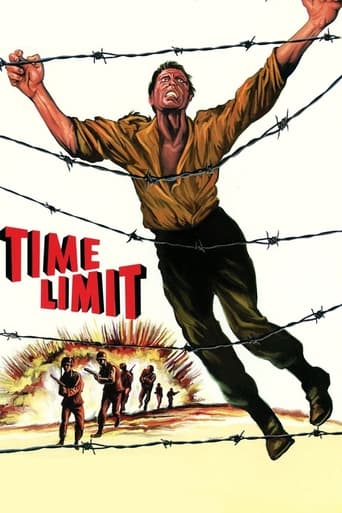fimimix
This gentleman has written my thoughts on "A Time Limit" exactly. I had a heck-of-a-time finding it in IMDb. I had to type-in "Richard Widmark movies" to find it. As the viewer stated, it is the only movie Carl Malden directed. It makes one wonder about the power-game in Hollywood and other places where movies are made. Yet, directing a movie must create a commsumate stress. The body of work Mr. Malden did as an actor speaks for itself, ditto for Widmark. His role in this film must have been a very important consideration for his role in "Judgment at Nuremberg".The war in Iraq has caused us to question "the code" for branches of the military. Who can speak for any member of them, or give reasons for their actions? Everything is different during wartime, especially if you are an officer who must take the responsibility for other men's lives. I always notice that highly commissioned officers who are interviewed on television are almost always "retired" - otherwise, they could not have taken the risk of breaking "the code". There are no personal, civil rights in the military - you are a part of a dictatorial branch of The Pentagon. I think "the code" creates inhumane situations.Another film on this subject includes "A Few Good Men", which graphically demonstrates the abuse by high-commissioned officers, whether it is blatant abuse of an officer's authority or to cover criminal offenses, as is demonstrated by the movie "......" does."A Time Limit" - apparently not seen by too many people except on TCM, where I saw it - exposes "the code" must treat even military-personnel as humans. Otherwise, there is no excuse for "the code"........all of the cast of this movie were excellent.
bkoganbing
I have to take exception to other reviewers calling Time Limit, a courtroom drama. There are no scenes in any courtroom, military or civilian. Still it's a very engrossing story.Richard Widmark is acting as an investigative officer for the Judge Advocate General's Office trying to ascertain if there are enough facts to bring Richard Basehart to trial for treason. Basehart was a prisoner of war in Korea who is accused of collaborating with the enemy.Through a lot of patient probing of Basehart and others, Widmark arrives at a very ugly story that while it doesn't totally exonerate Basehart it does give him the basis for a defense. So much so that Widmark requests he be assigned as Basehart's attorney when he does come up for court martial.Time Limit ran for 127 performances on Broadway in 1956 and starred Arthur Kennedy and Richard Kiley in the roles Widmark and Basehart play. Widmark's good friend Karl Malden did this one time only job of directing and gets good performances from his cast.Time Limit asks a lot of disturbing questions about the behavior of prisoners of war and whether we expect too much from them. Ironically when the USS Pueblo was taken by the North Koreans in the late sixties, these same questions were asked for real.
herbqedi
I had seen Time Limit three times before, always greatly admiring and appreciating the taut court-martial drama. I find it unfortunate that Malden never took another director's turn after such an impressive debut. The acting and direction still hold up well with tour-de-force performances by Basehart and Widmark. These are complemented nicely by dead-on portrayals by Carl Benton Reid, Rip Torn, Martin Balsam, and Yale Wexler as far less humane military characters. Dolores Costello and June Lockhart also give strong performances.But, the reason I write this today is to comment upon how timely Time Limit is to today's POW controversies. In this regard, I consider the 1962 film "the Hook" with Kirk Douglas almost as a companion piece. The questions are the same. How far should a soldier suppress his humanity in the name of the Army Code? How accountable should a soldier be held who defies the code in order to act in accordance with his conscience? How accountable should a soldier be held who obeys orders later judged to be inhumane? All these are central issues in wake of the recent Abu Gharib controversies.
Time Limit does an excellent job of examining these dilemmas and convincing those of us who weren't already convinced that there are no easy answers. War, by its nature, is an inhumane activity, ordered by humans and executed by humans who to accomplish their orders must deny within themselves subjugate the very humanity that gives each of us his or her purpose in life. Time Limit and The Hook both provide thoughtful and fairly objective examinations of the issues involved.Time Limit has always been worth watching. Its renewed relevancy just makes it even more so.
Thalberg
Richard Widmark exudes concern and empathy as an army colonel investigating the circumstances behind a charge of treason. The film also contains effective performances by Richard Basehart, as the accused traitor, a major who shares a secret he is unwilling to reveal, and a young Rip Torn as a lieutenant who is also willing to keep the secret even though he knows it will lead to a miscarriage of justice. The film is based on a play, and Karl Malden, in his only directing assignment, tries hard to open it up, but most of the scenes take place in Widmark's office, and there are way too many point of view shots of one person talking while another listens. Malden does make effective use of a few flashbacks to a frigid P.O.W. barracks in North Korea, and there are some interesting shots of the military base at Governors Island in New York City, but the film suffers somewhat from staginess. Piercing, discordant, almost alarmingly loud music by Fred Steiner punctuates scenes in the P.O.W. camps, where a complex mixture of motives lead to actions that have devastating consequences.


